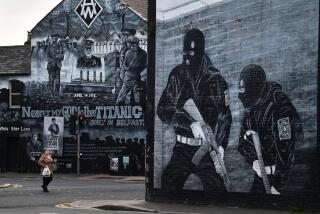Thatcher Pushes Ulster Security Review
- Share via
LONDON — Prime Minister Margaret Thatcher is supervising a major review of security measures in Northern Ireland as the result of a recent upsurge in violence there.
Since an Irish Republican Army bomb killed eight British soldiers Aug. 20, Thatcher has met four times with Tom King, the secretary of state for Northern Ireland, and has consulted with other senior Cabinet ministers, including Foreign Secretary Geoffrey Howe and Defense Secretary George Younger.
The review follows the bloodiest month in 15 years in Northern Ireland, also known as Ulster, in which 25 people, including 13 British soldiers, were killed.
For decades, Northern Ireland has suffered sporadic sectarian violence. On one side are Roman Catholic elements--members of the outlawed IRA, for the most part--fighting to drive out the British and unite Northern Ireland with the Irish Republic under a socialist banner; on the other are radical Protestant paramilitary groups committed to resisting any ties with the Irish Republic.
The recent escalation of the killing is linked mainly to increased IRA attacks on British soldiers--there are about 10,000 of them stationed in Northern Ireland--and these attacks are aimed at sapping Britain’s political will to stay in the province. But few expect Thatcher to be influenced by the campaign.
“Terrorism will not win,” she vowed after the Aug. 20 attack.
She has since ordered a drive aimed at cracking down on illegal clubs, protectionist gangs and numerous tax dodges that generate the equivalent of several million dollars a year for the IRA.
Other Measures Studied
Other measures are reportedly being considered. British officials decline to say what they might be, but veteran observers of the conflict in Northern Ireland say they are likely to include:
-- Changing legal procedures dealing with persons charged with terrorist offenses, including the suspension of the right to remain silent. This would require specific legislation and presumably would permit a judge to interpret silence as an admission of guilt.
-- Increasing police and military intelligence activities in Northern Ireland, strengthening military patrols along the border between Northern Ireland and the Irish Republic and intensifying security at potential IRA targets.
-- Implementing a proposal requiring all candidates for political office in Northern Ireland, including members of Sinn Fein, the IRA’s legal political wing, to sign a pledge renouncing violence.
Sinn Fein alleges that the Thatcher government now has a shoot-to-kill policy that permits security forces to kill rather than attempt to arrest suspected IRA members.
Senior British government officials vehemently deny that any such policy is in effect, but the controversy was rekindled last week with the ambush killing by British security forces of three IRA men near the town of Omagh.
The killings occurred 11 days after an IRA bomb near Omagh destroyed a bus filled with British soldiers returning from leave, killing eight and wounding 28.
After several days of silence on the second incident, British officials said the troops fired on the IRA men only after being fired on.
King refuses to disclose the rules of engagement under which British forces operate in Northern Ireland, but he indicated that soldiers are permitted to fire in self-defense against a “perceived threat.”
An inquest that opened Tuesday in Gibraltar, into the killing there last March of three IRA members by men of the British army’s elite Special Air Services, also focuses on the alleged shoot-to-kill policy.
The three IRA members were killed in front of scores of witnesses on a Sunday afternoon as they walked toward Gibraltar’s frontier with Spain. At least one witness has said she saw the three attempt to surrender. Evidence has come to light that indicates that the three were planning to place a car bomb near a military barracks to coincide with a weekly military parade.
More to Read
Sign up for Essential California
The most important California stories and recommendations in your inbox every morning.
You may occasionally receive promotional content from the Los Angeles Times.













